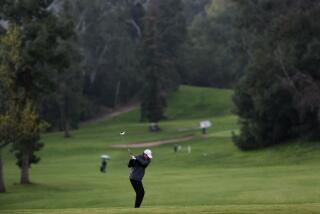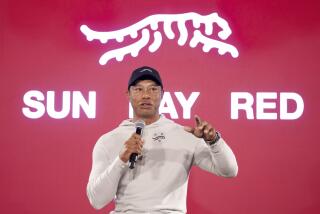Golf-Club Makers Come Out Swinging
- Share via
A public shouting match has erupted between two of the nation’s leading golf-club makers, Callaway Golf Co. and Taylor Made, stemming from an ongoing debate over whether the sport should clamp down on high-tech equipment.
The two Carlsbad-based companies’ verbal sparring is the latest flap in a controversy that first engulfed the $2-billion golf-club industry this spring. That’s when the U.S. Golf Assn., the sport’s governing body, pondered whether to ban the oversized metal clubs so popular with America’s 26 million golfers.
The USGA ultimately declared today’s exotic clubs, which can cost several hundred dollars apiece, as legal. But it proposed developing new tests to ensure that future club designs don’t give players an unfair advantage. On Monday, it held a “town meeting” with club makers to discuss the issue.
Most manufacturers objected to more stringent tests. But Taylor Made, a unit of German sneaker maker Adidas-Salomon, agreed with one of the USGA’s key proposals: To test new clubs’ “spring-like effect,” or how the golf ball jumps off the club’s face. And it issued a press release to let the world know its position.
That lit the fireworks.
Ely Callaway, the outspoken founder and chairman of Callaway Golf, blasted Taylor Made for cozying up to the USGA. Noting that Taylor Made and Adidas sneakers are now sold by the same company--Adidas bought French sporting-goods maker Salomon, which owned Taylor Made, last year--Callaway asserted in a statement that Taylor Made was “ready to throw in the towel” on club development in order to spend its cash on “fashion, styling and marketing.”
By endorsing new tests, Taylor Made “wants to both give up the technological race itself and hang millstones around the necks of its competitors,” Callaway said.
Outraged, Taylor Made President George Montgomery fired off a statement calling Callaway’s remarks “desperate comments by a wounded competitor” that has seen its sales, market share and stock price all decline in recent months.
Montgomery also said the comments “are offensive” to its employees and customers, and that Taylor Made has “never been more committed to the development of new technology.”
Indeed, Callaway Golf--maker of the famed Big Bertha oversized metal drivers--is a company in trouble. Owing to slowing U.S. demand and even worse conditions in Asia, Callaway’s profit in the first half of this year plunged 55% from a year earlier, and its stock price has plummeted 71% over the last 12 months. The stock closed Thursday at $10.25 a share, down 31 cents, in New York Stock Exchange trading.
Callaway still holds the biggest share of the U.S. market for metal woods, but its lead has narrowed this year, said Tom Stine, co-founder of the research firm Golf Datatech Ltd. in Kissimmee, Fla. He declined to provide specific figures.
Taylor Made, in fact, is now No. 1 in unit sales of metal woods sold at “off-course” golf specialty stores, that is, excluding “pro shop” stores located on golf courses, Stine added.
Moreover, the companies are now battling for shares of a shrinking market. Industrywide club sales are down 7.4% this year, Stine said, owing to El Nino’s heavy rains this spring and a flattening of consumer demand after several years of sharp gains.
Even so, Callaway’s remarks still shocked Taylor Made, Montgomery said in a telephone interview Thursday. “I was surprised by the type of attack they put forward,” he said. “It was an uncharacteristic low blow.”
But Ely Callaway defended his remarks. In a separate interview, he said the USGA’s rule proposals “are harmful to the golf-club industry,” and that golfers “deserve the advantage of whatever technology we can produce.” Taylor Made was “the single one that took a position that was totally different,” he said.
Why criticize Taylor Made in public? “They put out a press release” announcing their stance, Callaway said. “So we responded.”
More to Read
Inside the business of entertainment
The Wide Shot brings you news, analysis and insights on everything from streaming wars to production — and what it all means for the future.
You may occasionally receive promotional content from the Los Angeles Times.









